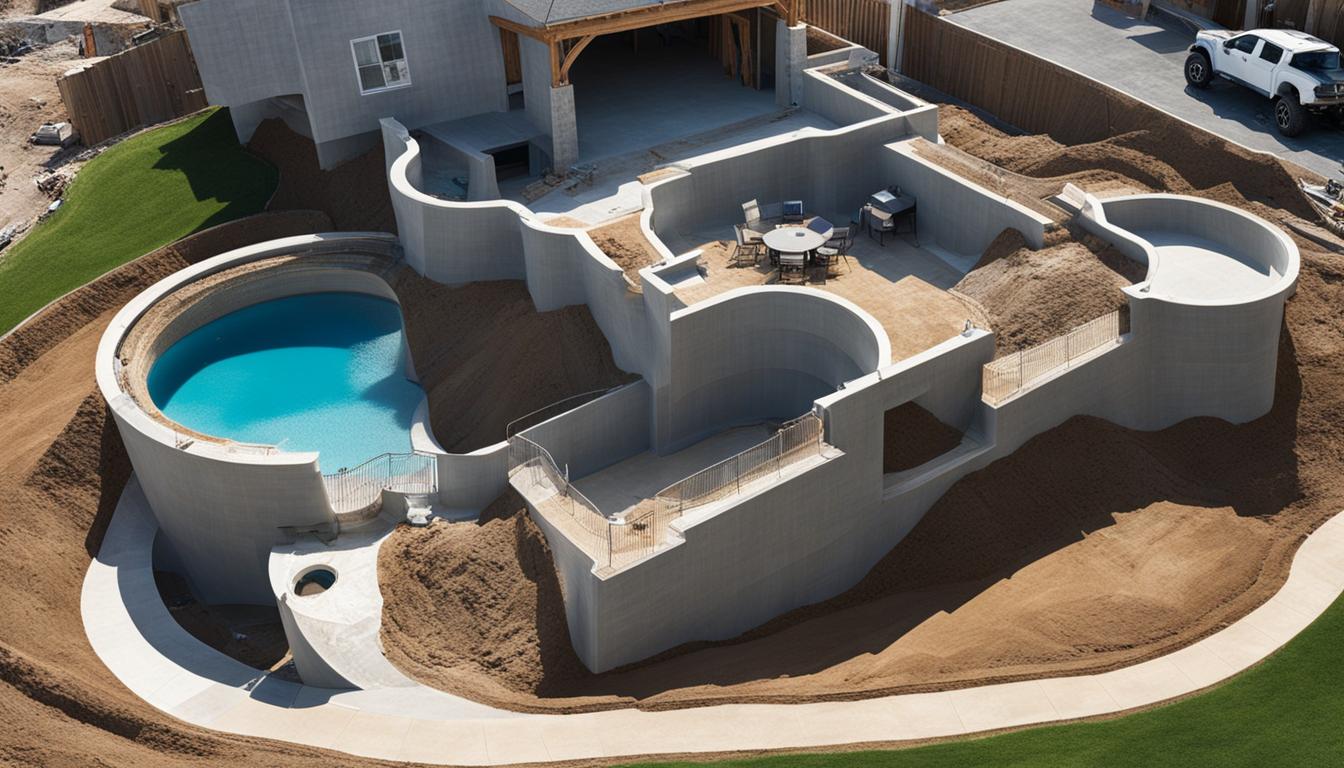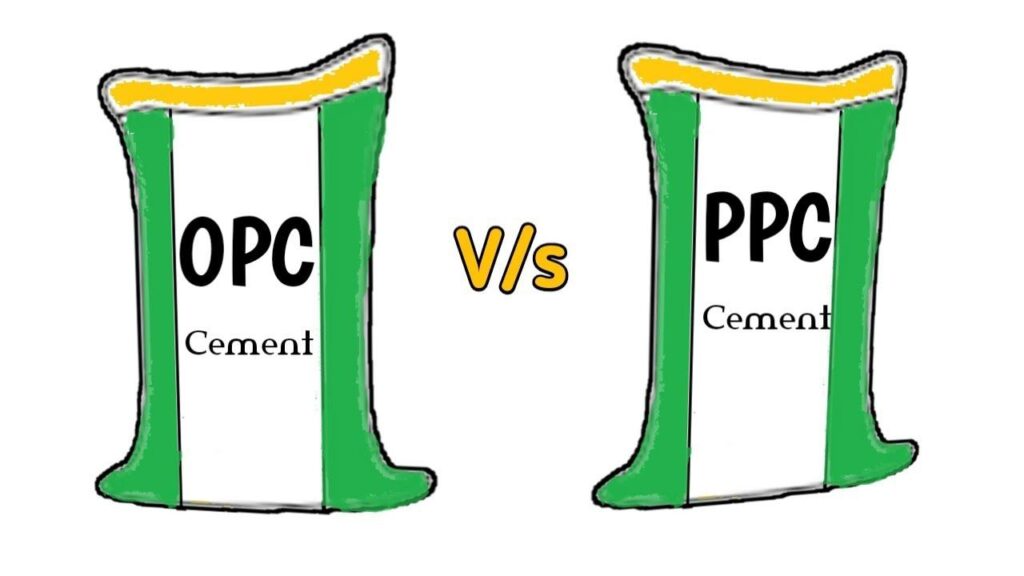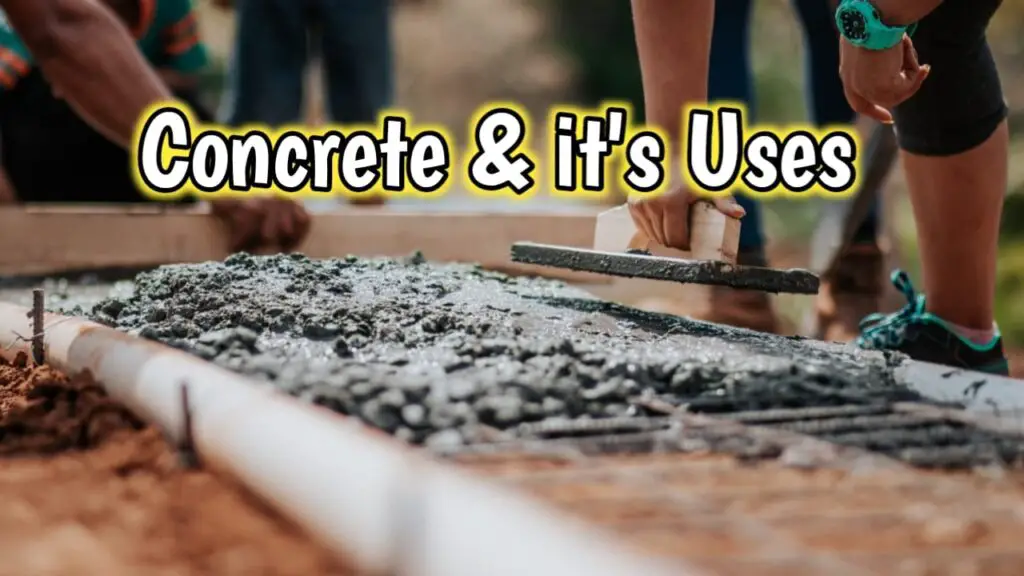4 Factors to Consider when Choosing between Shotcrete and Gunite for Pool Construction
Building a pool is a significant investment that requires careful consideration and planning. As you explore different pool construction options, you may come across the terms shotcrete and gunite. So what’s the difference? In this article, we will compare these two popular pool construction methods – Shotcrete vs Gunite Pool Construction – and help you understand which one is right for your project.
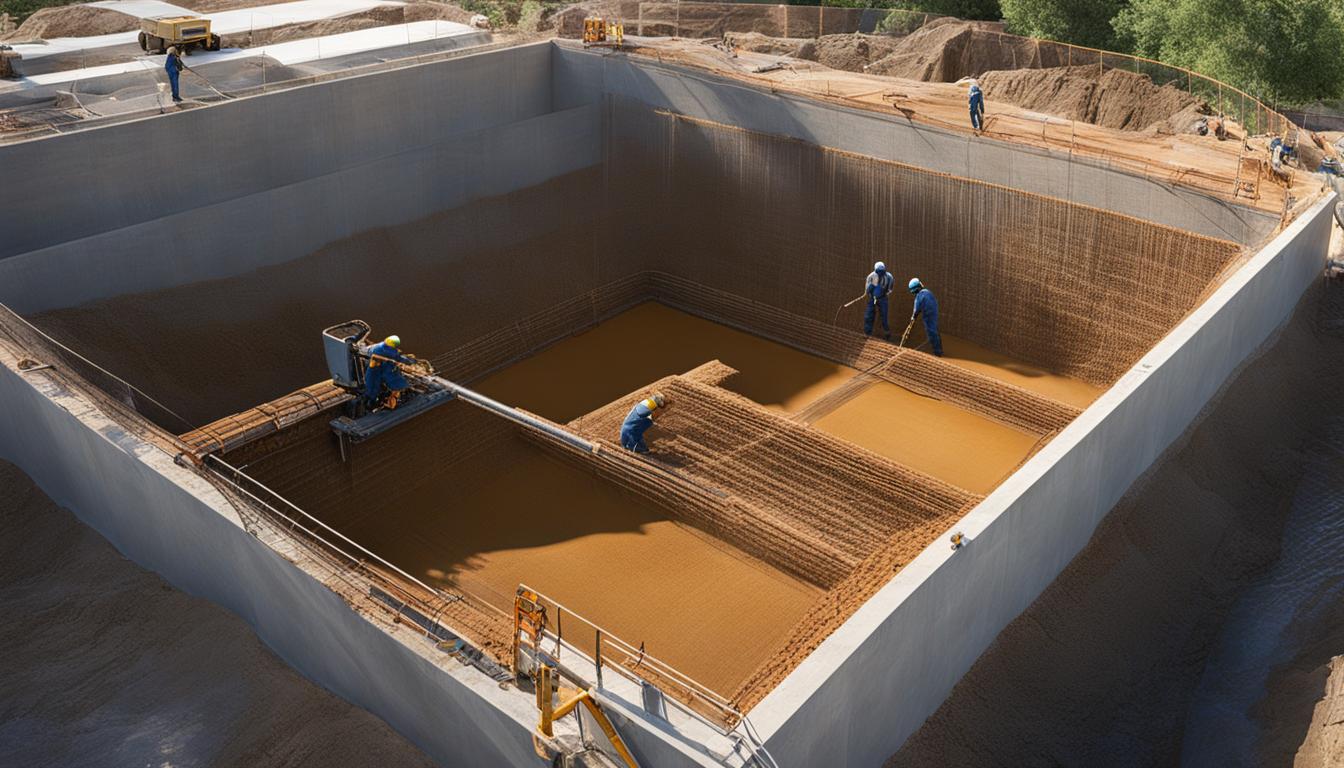
Key Takeaways
- Shotcrete and gunite are popular pool construction methods.
- Shotcrete is a spray-on mixture of cement and sand, while gunite is a dry mix of cement and sand that is mixed with water on-site.
- Both methods offer advantages such as durability, flexibility, and customization options.
- The differences between shotcrete and gunite lie in their application process, materials used, and suitability for various pool designs.
- Important factors to consider when choosing between shotcrete and gunite include budget, timeline, design preferences, and geographical considerations.
What is Shotcrete?
If you’re planning to build a pool, you may have heard of the term “shotcrete.” Essentially, shotcrete is a type of concrete that is sprayed onto a surface using a high-pressure hose. It is commonly used in pool construction due to its durability and versatility.
The materials used in shotcrete pool construction include cement, sand, water, and small aggregates. These ingredients are then mixed and fed into the nozzle of the hose, where compressed air forces the mixture out at high speeds.
During the application process, the shotcrete is evenly sprayed onto reinforced steel mesh or other forms of support structure, creating a seamless and sturdy surface. This method allows for intricate designs and shapes to be formed, ensuring a custom-built pool that meets your needs.
With shotcrete, the process is quicker than traditional concrete methods, allowing for less invasive and quicker pool construction. Additionally, shotcrete can be applied to most surfaces, making it a versatile choice for pool construction on a variety of terrains.

Overall, shotcrete pool construction offers a long-lasting and customizable solution for pool builders. By understanding the basics of shotcrete, you can make an informed decision when it comes to building the perfect pool for your home.
What is Gunite?
In swimming pool construction, gunite refers to a dry-mix process where dry sand and cement mixture is fed through a hose and combined with water at the nozzle. By using high air pressure, the wet mixture is sprayed onto steel or wire mesh, forming a structurally sound pool shell.
The most frequent application of gunite is in constructing concrete swimming pools; however, it can also be utilized in various other projects, including tunnel linings, retaining walls, and soil stabilization.
Compared to shotcrete, gunite features a higher cement-to-water ratio, resulting in a denser, more robust, and water-resistant structure. Moreover, the gunite process involves less water, which means faster drying time, minimal shrinkage, and reduced cracking risk.
Shotcrete vs Gunite: Similarities
Although shotcrete and gunite are different construction methods, they share some common features and advantages.
One of the most significant similarities between shotcrete and gunite is their strength and durability. Both methods create structures that can withstand extreme temperatures and harsh weather conditions.
Another similarity is that both methods allow for flexibility in design. Shotcrete and gunite can be used to create custom shapes and designs, making them popular for building unique and intricate pools.
Additionally, both methods are known for their efficiency and speed of installation. Shotcrete and gunite can be applied quickly, reducing construction time and costs compared to other traditional pool-building techniques.
Finally, both methods require the expertise of professional contractors who specialize in this craft. As a result, you should only work with certified contractors to ensure successful construction and long-lasting results.
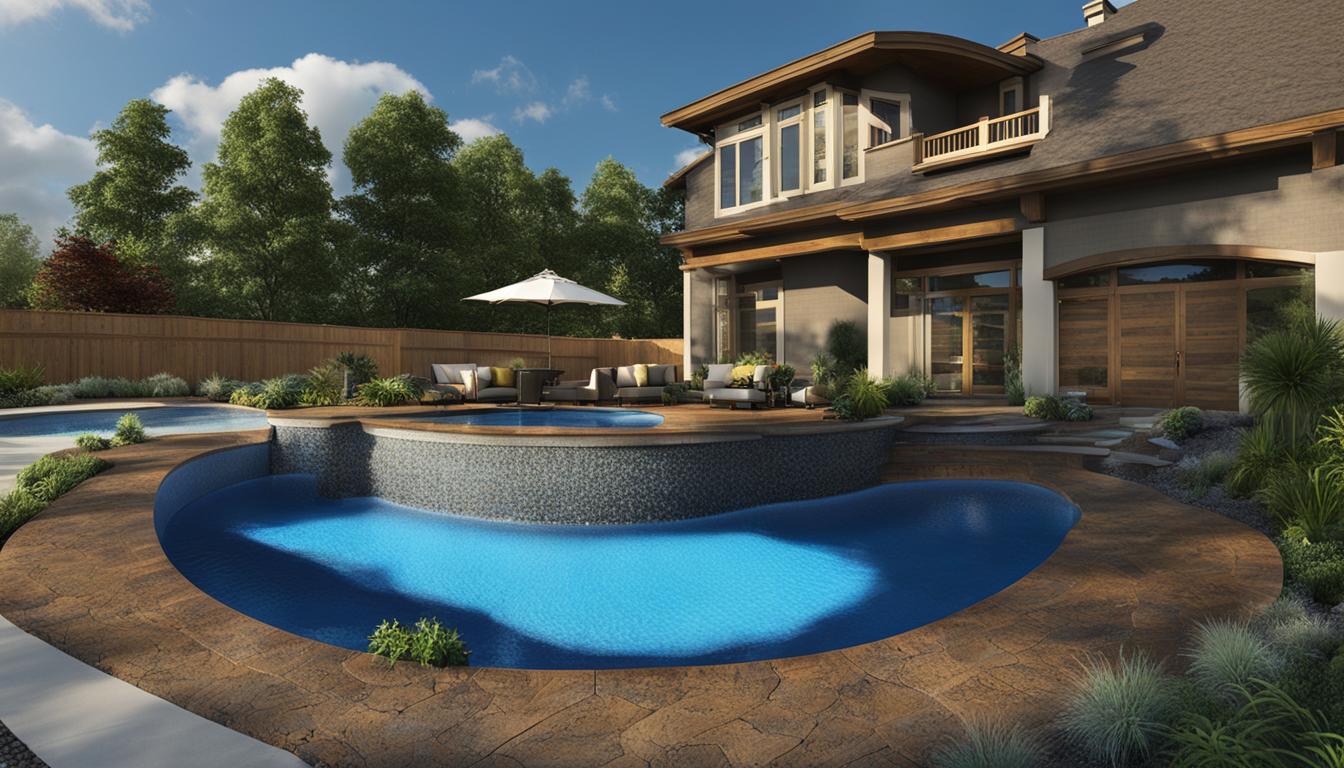
Shotcrete Pool Construction: Advantages
If you’re looking for a pool construction method that combines durability, flexibility, and customization, shotcrete may be the solution you need. Shotcrete is a concrete mixture that is reinforced with steel fibers or mesh, which is sprayed onto a structure. Here are some of the key advantages of shotcrete pool construction:
Durable
Shotcrete pools are renowned for their durability. A shotcrete pool is resistant to weather damage and erosion, which means it can withstand harsh weather conditions for long periods, making it a popular choice for homeowners looking for a long-lasting pool.
Flexible
One of the key benefits of shotcrete is its flexibility. It can be molded into any shape or design, giving pool builders almost unlimited design possibilities. This means that you can have a shotcrete pool that fits any area in your backyard, no matter how complex or unique.
Customizable
Shotcrete offers endless customization options, giving homeowners the ability to create a truly unique pool. Whether you want to add a rock waterfall or create a beach entry, shotcrete makes it possible to turn your dream pool into a reality.
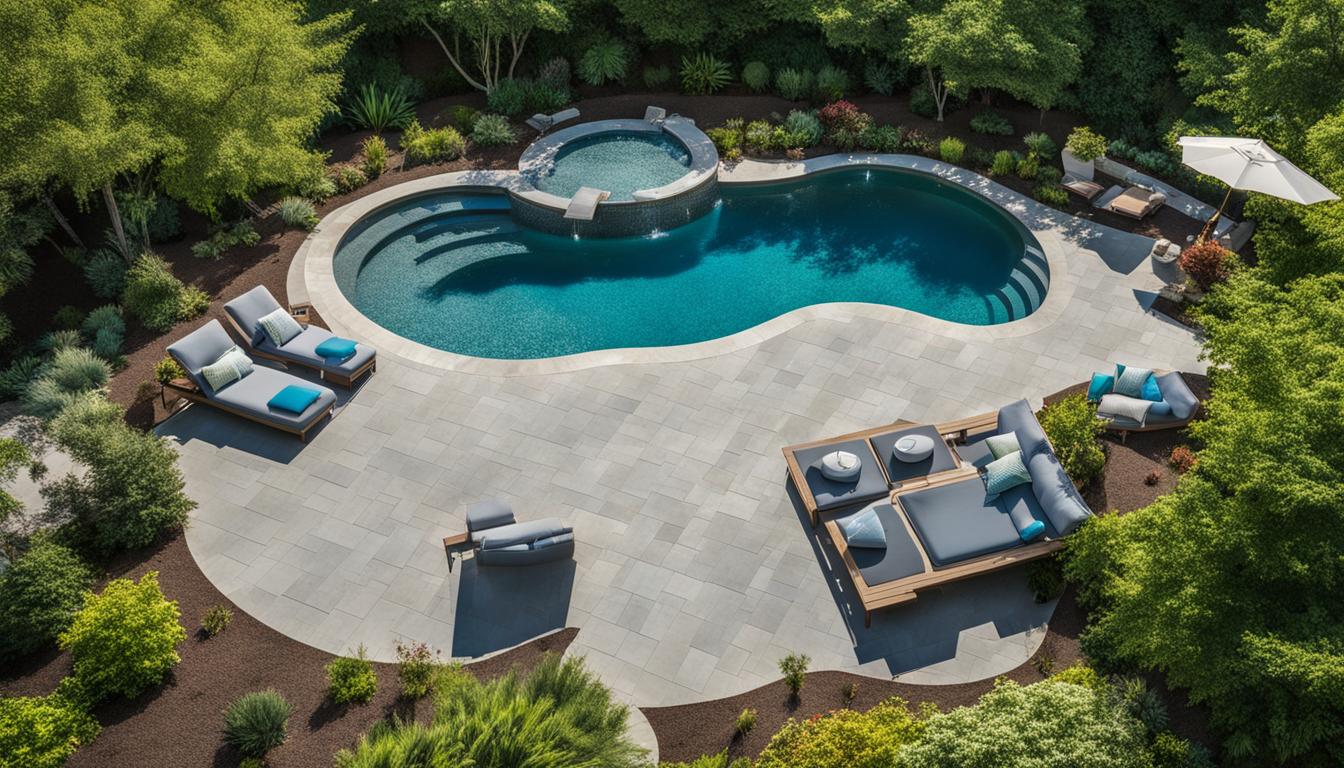
“Shotcrete is an excellent option for homeowners who want a pool that is both durable and customizable. Its strength and flexibility make it perfect for creating unique designs that stand the test of time.”
Gunite Pool Construction: Advantages
When it comes to constructing a pool, gunite offers some unique advantages that set it apart from other methods. Let’s take a closer look at some of the advantages of gunite pool construction:
Ability to Create Intricate Designs
Gunite is a versatile material that allows for intricate designs that can’t be achieved with other pool construction methods. The flexibility of the material allows for curves, angles, and other unique shapes to be added to the pool design. This makes Gunite an ideal choice for creating a custom pool that fits your specific needs and preferences.
Speed of Construction
Compared to other pool construction methods, gunite is relatively fast to build. This is because the application process is streamlined and requires fewer materials than other construction methods. This means you can have your dream pool up and running in a shorter amount of time.
Resistance to Environmental Factors
Gunite is a durable material that is resistant to environmental factors like temperature changes, earthquakes, and soil movements. This makes it an ideal choice for areas that are prone to natural disasters. Additionally, gunite is resistant to wear and tear, meaning it can withstand regular use for years to come.
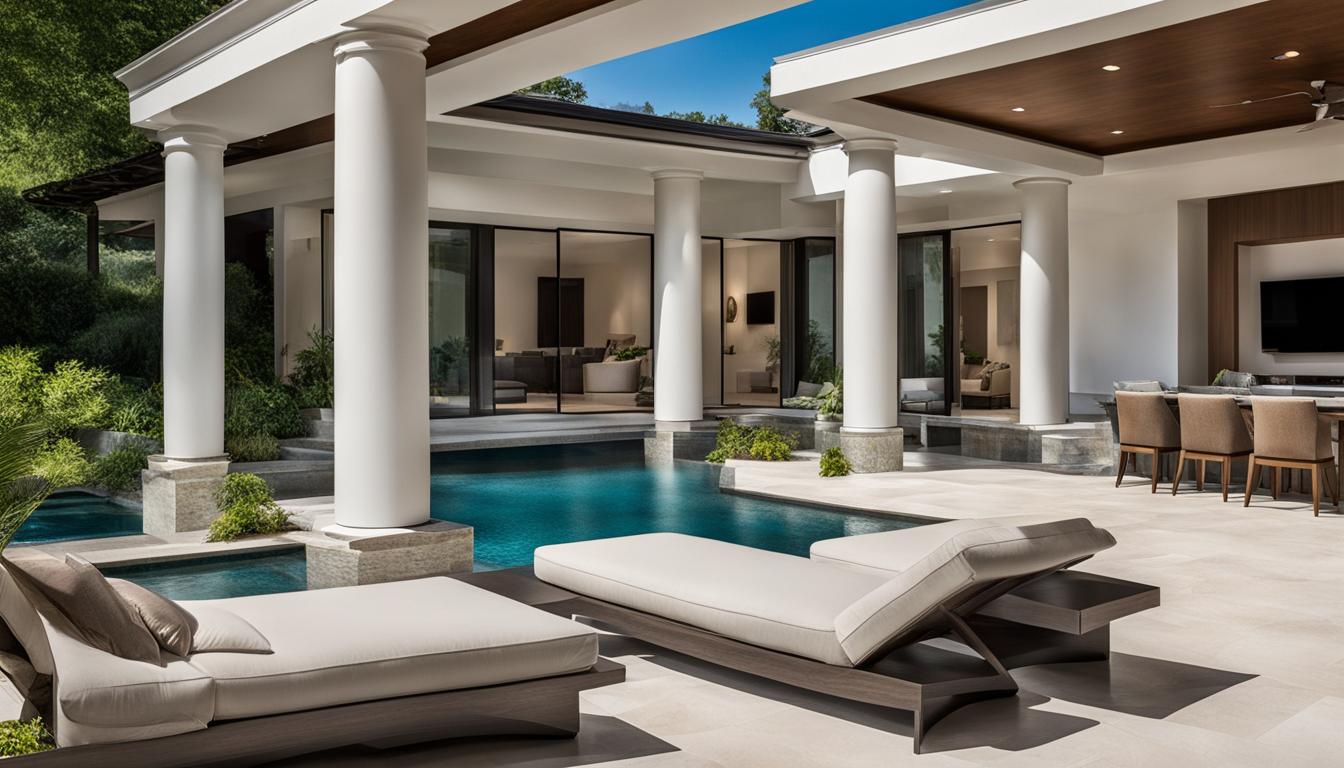
When compared to other methods, gunite pool construction offers unique advantages that make it a popular choice for a custom pool. With its ability to create intricate designs, fast construction, and resistance to environmental factors, gunite may be the right choice for your next pool project.
Shotcrete vs Gunite: Differences
When it comes to pool construction, the application process and materials used can greatly affect the final result. Shotcrete and gunite are two popular methods with distinct differences that can influence your choice. Here are the main differences between shotcrete and gunite pool construction:
| Factor | Shotcrete | Gunite |
|---|---|---|
| Application process | Shotcrete is a wet mixture of sand, cement, and water that is sprayed onto a surface at high velocity. It requires an air compressor and specialized equipment for application. | Gunite is a dry mixture of sand and cement that is mixed with water at the application site. It requires a specialized gunite pump that sprays the mixture with compressed air. |
| Materials | Shotcrete uses a mix of sand, cement, and water. It can be reinforced with steel or synthetic fibers for added strength and durability. | Gunite uses a mix of sand, cement, and water. One key difference is that gunite doesn’t require any additional water when mixed, as the water is added during application. |
| Suitability for various pool designs | Shotcrete is a good choice for pools with complex designs and curved walls. Due to its wet application, it can be molded into any shape or size. | Gunite is ideal for pools with unusual shapes and designs. It can also be used to create features such as waterfalls or intricate mosaics |
Overall, the main difference between shotcrete and gunite lies in the application process and the materials used. Shotcrete is a better fit for projects that require a high degree of customization and flexibility, while gunite is preferred for complex designs that require precision and detail.
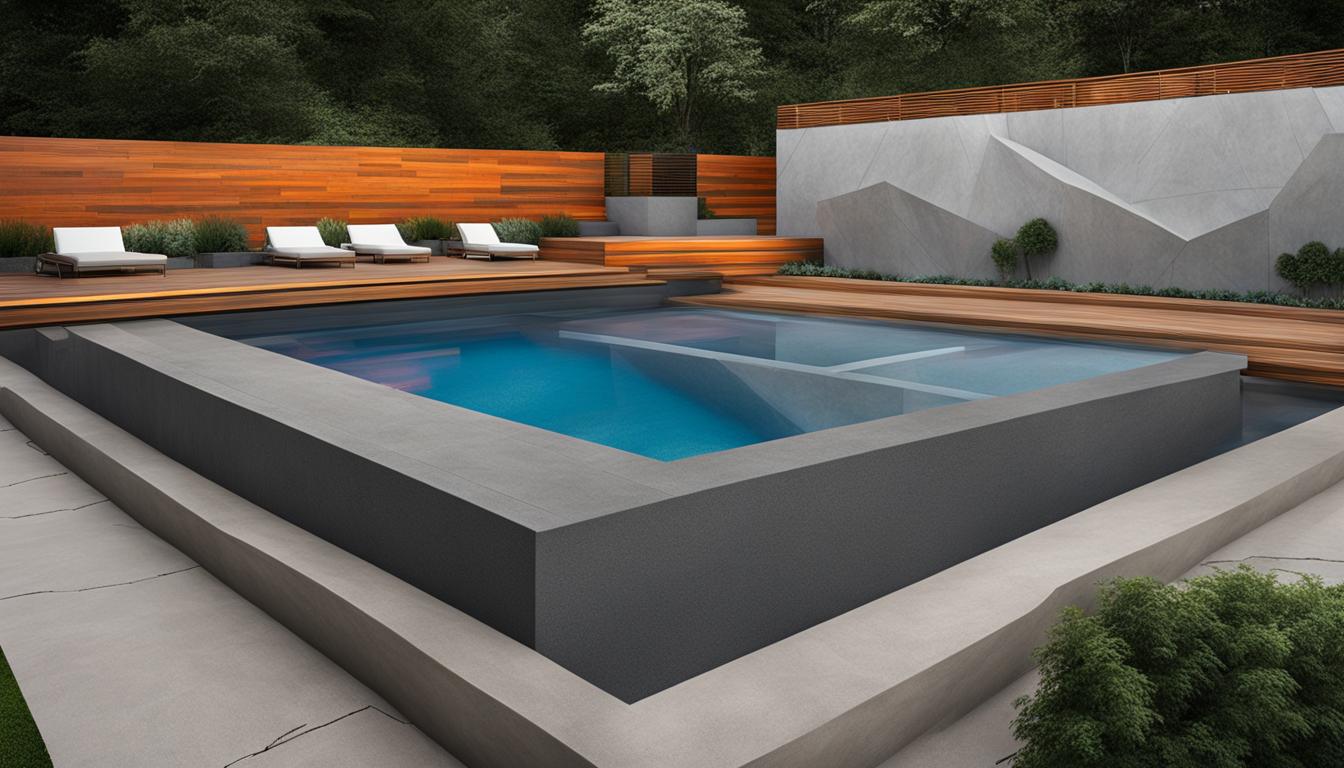
Factors to Consider when Choosing between Shotcrete and Gunite
Choosing between shotcrete and gunite for your pool construction project can be a daunting task. Here are four important factors to consider:
Budget
Shotcrete and gunite have different price points, and the cost of your project can vary depending on factors like the size, complexity, and location of your pool. While shotcrete tends to be more expensive than gunite, it may be worth the investment if you want a pool that lasts for decades.
Timeline
If you need your pool built quickly, gunite may be the best choice. It takes less time to apply, and there is no waiting time for the material to dry. Shotcrete, on the other hand, requires a curing period and may take longer to complete.
Design Preferences
Both shotcrete and gunite offer a range of design options, but they have different strengths. Shotcrete is more flexible and allows for intricate custom shapes, while gunite is ideal for more natural-looking designs like rock formations or waterfalls.
Geographical Considerations
Your location can also influence your choice between shotcrete and gunite. Shotcrete is ideal for areas with colder climates because of its durability and strength, while gunite may not be suitable for areas with high seismic activity due to its rigid nature.

By weighing these factors, you can make an informed decision about which method of pool construction is the best fit for your needs.
Conclusion
After comparing shotcrete and gunite pool construction techniques, it is evident that both methods have their unique advantages and similarities. Shotcrete offers excellent flexibility and customization, making it an ideal choice for homeowners looking to build a pool that can withstand harsh weather conditions and last for decades. On the other hand, gunite offers a faster process of construction and the ability to create intricate designs, perfect for those with a more bespoke vision in mind.
Choosing between shotcrete and gunite depends on various factors, including budget, timeline, design preferences, and geographical considerations. Understanding these factors is essential to make an informed decision about which method is best for your pool construction project.
In conclusion, when comparing shotcrete vs gunite pool construction, it is crucial to understand their unique properties and benefits. Regardless of your choice, you can rest assured that both methods will provide a sturdy, long-lasting pool that will bring you joy and relaxation for years to come.
Thanks For the Great Attention!
Good Bye & Take Care
Happy Learning
Also, Read,
FAQ
What is the difference between shotcrete and gunite in pool construction?
Shotcrete and gunite are two popular methods used in pool construction. The main difference between the two lies in the composition of the materials used. Shotcrete consists of a mixture of cement, sand, and aggregate, while gunite incorporates cement and sand mixed with water at the nozzle. Both methods offer durability and flexibility, but the application process and material composition set them apart.
What is shotcrete?
Shotcrete is a construction technique used in pool construction. It involves spraying a mixture of cement, sand, and aggregate, also known as shotcrete mix, onto a structural framework or excavated ground. The shotcrete mix is propelled using compressed air through a hose and nozzle, allowing for precise and efficient application. Shotcrete offers strength, durability, and customization options, making it a popular choice in pool construction.
What is gunite?
Gunite is a construction method commonly used in pool construction. It consists of spraying a mixture of cement and sand, known as gunite mix, mixed with water at the nozzle using compressed air. The gunite mix is applied onto a structural framework or excavated ground, forming a solid and durable surface. Gunite offers versatility and the ability to create intricate designs, making it a favored choice for pool builders.
What are the similarities between shotcrete and gunite pool construction?
Shotcrete and gunite pool construction share several similarities. Both methods involve the application of a mixture of cement, sand, and sometimes aggregate onto a structural framework or excavated ground. They offer durability, and flexibility in design, and can be customized to meet specific requirements. Additionally, both shotcrete and gunite provide a solid and resilient surface for swimming pools.
What are the advantages of shotcrete pool construction?
Shotcrete pool construction offers numerous advantages. Firstly, it provides exceptional strength and durability, ensuring the longevity of the pool. Shotcrete also offers flexibility in design, allowing for the creation of unique shapes and features. Moreover, shotcrete pools can be customized with various finishes, such as tiles or pebbles, to achieve the desired aesthetic. Overall, shotcrete is a reliable and versatile choice for homeowners seeking a long-lasting pool.
What are the advantages of gunite pool construction?
Gunite pool construction offers several advantages. One of its key benefits is the ability to create intricate designs and complex shapes, making it ideal for achieving unique and visually appealing pool structures. Gunite pools are also known for their speed of construction, as the application process is quick and efficient. Furthermore, gunite is highly resistant to environmental factors such as freeze-thaw cycles and soil movement, ensuring the longevity of the pool.
What are the differences between shotcrete and gunite pool construction?
Shotcrete and gunite differ in terms of their application process and material composition. Shotcrete is a mixture of cement, sand, and aggregate sprayed onto a structural framework using compressed air. Gunite, on the other hand, is a mixture of cement and sand mixed with water at the nozzle using compressed air. While both methods provide durability and flexibility, shotcrete is known for its ease of application and suitability for various pool designs, while gunite excels in creating intricate and detailed shapes.
What factors should be considered when choosing between shotcrete and gunite?
When deciding between shotcrete and gunite for pool construction, several factors should be taken into consideration. Budget is an important consideration, as the cost of materials and application methods differ between shotcrete and gunite. Timeline is another factor, as the construction time may vary depending on the chosen method. Design preferences also play a role, as shotcrete allows for greater flexibility in shape and finishes. Lastly, geographical considerations such as soil conditions and climate should be assessed to ensure the chosen method is suitable for the specific location.

